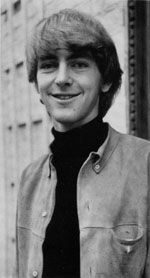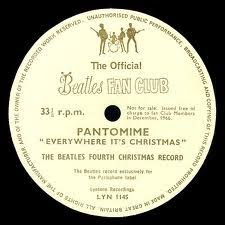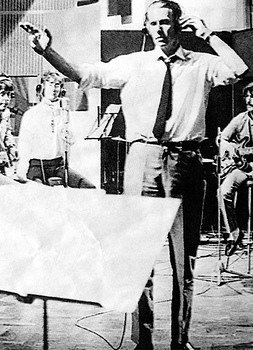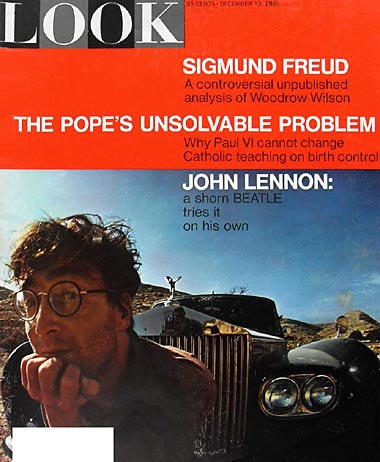John Lennon Interview: Look Magazine 12/13/1966 (Part Two)
This is what a Lester set is like: Once more, they are in a deserted German square, now, with all the paraphernalia of movie-making, with British 'soldiers,' Lennon among them, ready to comb the streets, with German 'soldiers' lying in wait. "Quiet please!" an assistant shouts -- just as a little boy walks into the scene. Apoplectic, the assistant rushes forward and shoves the child aside. Lester, whose normal weapon is humor, flushes. "Don't push!" he commands.
Once again, they are ready to shoot -- and once again, the child intrudes. For 15 seconds, Lester eyes the man silently. Then, "Boo," he calls, and "Boo" the cast joins in.
For Lester, a director makes no statement against violence by having thousands die. To him, each death must matter -- and in his new film, each does. Such were the ideas that captured Lennon, despite his doubts about himself.
He did not doubt alone. How I Won The War is staffed with seasoned British actors, all trained in repertory, all well-known at home and all suspicious. But none is today.
Samples:
"We expected someone a bit kinky, bitchy, arrogant. He is none of those things. He's completely natural."
"You're not working with another actor, you're working with an OBE, a multimillionaire -- in sterling, not dollars -- whose every word will be reported in the world press. The miracle is that he's so normal. I could wrap him up dialectically in two minutes, intellectually, in three. But he's got a certain inborn, prenatal talent. I have my talent, which I think is considerable, but it doesn't compare in his field."
"I don't think he does anything with a conscious thought of trying to impress. He's remarkably free. He does not act the part."
"We talk about him all the time. All of us feel the same thing. We find it difficult to be as normal with him as he is with us."
Lennon's lack of pretense astonished the actors. "He's someone who just tries anything," one of them marveled. "No stand-in, no special treatment, no chair for him."
During a break for tea one raw morning, Lennon queued with the rest. When his turn arrived, his heart's desire was gone. "You don't have to be a star to get a cheese sandwich," he mused. "You just have to be first."
They like his humor too. That same morning, a German mother pushed her three-year-old son up to the Beatle, clutching his autograph book in his hand. "Sign it!" she demanded. Lennon did as bidden, telling the boy, "Yes, sir, you put us where we are today." On location in Spain one afternoon, the script required Lennon to drive a troop carrier along the beach. Accelerating too fast, he spun the wheels; the rear of the carrier sank. As his crestfallen director approached the cab, Lennon peered sheepishly over his glasses and gave him a limp salute.
Lennon is not on; he is simply original. "America used to be the big youth place in everybody's imagination. America had teenagers and everywhere else just had people." He recognizes his own impact on the changes since then, but he refuses to concede that youth today is all that different -- particularly youth in England.
The last generation might have been just like today's young adults, he maintains, had it not had to fight the war.
"If they said, 'Fight the war now,' my age group would fight the war. Not that they'd want to. There might be a bit more trouble gettin' them in line -- because I'd be up there shouting, 'Don't do it!'"
"It just so happens that some groups playing in England are making people talk about England, but nothing else is going on. Pop music gets through to all people all over the world, that's the main thing. In that respect, youth might be together a bit. The Commie youth might be the same as us, and we all know that, basically, they probably are. This kind of music and all the scene is helping. But there's more talk about it than is actually happening. You know, swinging this, and all that. Everybody can go around in England with long hair a bit, and boys can wear flowered trousers and flowered shirts and things like that, but there's still the same old nonsense going on. It's just that we're all dressed up a bit different."
"The class thing is just as snobby as it ever was. People like us can break through a little -- but only a little. Once, we went into this restaurant and nearly got thrown out for looking like we looked until they saw who it was. 'What do you want? What do you want?' the headwaiter said, 'We've come to bloody eat, that's what we want,' we said. The owner spotted us and said, 'Ah, a table sir, over here, sir.' It just took me back to when I was 19, and I couldn't get anywhere without being stared at or remarked about. It's only since I've been a Beatle that people have said, 'Oh, wonderful, come in, come in,' and I've forgotten a bit about what they're really thinking. They see the shining star, but when there's no glow about you, they only see the clothes and the haircut again."
"We weren't as open and as truthful when we didn't have the power to be. We had to take it easy. We had to shorten our hair to leave Liverpool and get jobs in London. We had to wear suits to get on TV. We had to compromise. We had to get hooked, as well, to get in and then sort of get a bit of power and say, 'This is what we're like.' We had to falsify a bit, even if we didn't realize it at the time."
If Lennon is compulsive about anything today, it's about truth as he sees it. But he protests when he's labeled a cynic.
I'm not a cynic. They're getting my character out of some of things I write or say. They can't do that. I hate tags. I'm slightly cynical, but I'm not a cynic. One can be wry one day and cynical the next and ironic the next. I'm a cynic about most things that are taken for granted. I'm cynical about society, politics, newspapers, government. But I'm not cynical about life, love, goodness, death. That's why I really don't want to be labeled a cynic."
It is in the context of the young man who recoils at distortion that his now-famous remark should be viewed. "I said it. I said we were more popular than Jesus, which is a fact." What he could not explain then was why.
He does not feel that one need accept the divinity of Jesus -- he, personally, does not -- in order to profit from his words. A frequent reader of ancient history as well as philosophy (his current lists includes a book on Indian thought and Nikos Kazantzakis's 'Report Greco'), he contends that man has mishandled Christ's words throughout the centuries.
"I believe Jesus was right, Buddha was right, and all of those people like that are right. They're all saying the same thing-- and I believe it. I believe what Jesus actually said-- the basic things he laid down about love and goodness -- and not what people say he said."
Christianity has suffered, he believes, not only because Christians have distorted Christ's words but because they concern themselves with structures and numbers and fail to listen to their vows. They 'mutter' and 'hum' their prayers, but pay no attention to the words. "They don't seem to be able to be concerned without having all the scene about, with statues and buildings and things."
"If Jesus being more popular means... more control, I don't want that. I'd sooner they'd all follow us even if it's just to dance and sing for the rest of their lives. If they took more interest in what Jesus -- or any of them -- said, if they did that, we'd all be there with them."
Would he call himself a religious person? "I wouldn't really. I am in the respect that I believe in goodness and all those things." And if being religious meant being 'concerned,' as Paul Tillich the late Protestant theologian, once put it? "Well, I am then. I'm concerned alright. I'm concerned with people."
At the age when most men are just beginning to adjust to the world, John Lennon has already nudged it a bit. The hysteria that surrounds him can no longer disguise the presence of a mind. His ideas are still rough, but his instincts are good and his talent, extraordinary. You may love him, you may loath him, but this you should know: As performer, composer, writer or talker, he'll be around for a long, long time.




